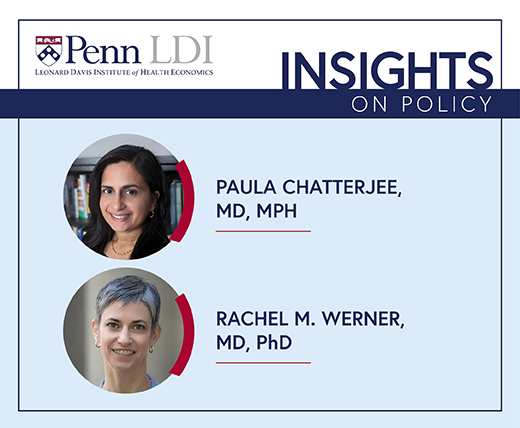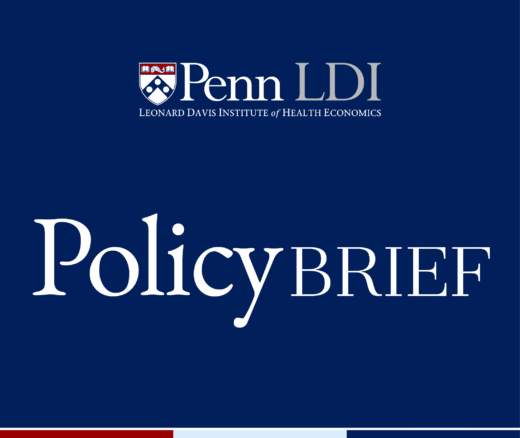
Nursing Home Incentive Program Falls Flat, New Work Explains Potential Reasons
A Major Federal Value-Based Purchasing Program Was Designed to Cut Hospital Readmissions. LDI Fellows Say the Incentives Are Too Small to Drive Real Change
News
Aaron Schwartz, MD, PhD, LDI Senior Fellow and Assistant Professor of Medical Ethics and Health Policy at the University of Pennsylvania Perelman School of Medicine, has won the 2025 AcademyHealth Alice S. Hersh Emerging Leader Award.
The prestigious honor recognizes professionals early in their careers who demonstrate exceptional promise for future contributions to the field of health services research. This distinction not only acknowledges the recipient’s potential, but also serves as a validation of research that has been both impactful and forward-thinking.

The award will be presented June 9 at the AcademyHealth Annual Research Meeting in Minneapolis, Minnesota.
The award is named in honor of Alice Hersh, who in 1982 became the founding Executive Director of the Association for Health Services Research, the organization that later changed its name to AcademyHealth. In a memorial written after her death in 1997, HSR journal editor Stephen Shortell, PhD, wrote that in Hersh’s 15 pioneering years at the AHSR helm, she “took the organization from ground zero and built it into the most respected and visible association representing health services and policy research in the world.”
As part of her relentless campaign to expand the presence and influence of HSR scientists, Hersh was especially interested in nurturing the discipline’s most promising new researchers. Toward that end, in 1986, she conceived and launched the annual award that was posthumously renamed in her honor.
As a health economist, Schwartz conducts research on measuring and improving the efficiency of U.S. health care delivery. His research is focused on the private provision of federal health care benefits, including Medicare Advantage and VA Community Care, low-value medical services, insurer coverage restrictions, and alternative health care financing arrangements.
Schwartz maintains an active primary care practice at the Corporal Michael J. Crescenz VA Medical Center in Philadelphia, where he serves as a core investigator at the VA Center for Health Equity Research and Promotion.
He is an alumnus of Swarthmore College, the Harvard MD-PhD Program, and the Brigham and Women’s Hospital Residency Program in Primary Care and Population Medicine.
Schwartz is the latest LDI Senior Fellow to receive the award. Past winners include Senior Fellows Shekinah Fashaw-Walters, PhD, MSHP, Assistant Professor of Medical Ethics and Health Policy; Rachel M. Werner, MD, PhD, Executive Director of LDI and Professor at both the Wharton and Perelman Schools; Kevin Volpp, MD, PhD, Director of the Center for Health Incentives and Behavior Economics and Professor at both Wharton and the Perelman Schools; and David A. Asch, MD, MBA, University of Pennsylvania Senior Vice President for Strategic Initiatives and Professor at both Wharton the the Perelman Schools.

A Major Federal Value-Based Purchasing Program Was Designed to Cut Hospital Readmissions. LDI Fellows Say the Incentives Are Too Small to Drive Real Change

Penn LDI’s Antonia Villarruel and 10 Other Authors Map Social Determinants Across Multiple Racial and Ethnic Groups

Memo: Response to Request for Analysis

Lessons from the Past, Imperatives for the Future

A New Study of a Sample of Facilities Found Half Without Any Behavioral Health Staff

Physicians Were Paid About 10% Less for Visits Involving Black and Hispanic Patients, With Pediatric Gaps Reaching 15%, According to a First-of-Its-Kind LDI Analysis